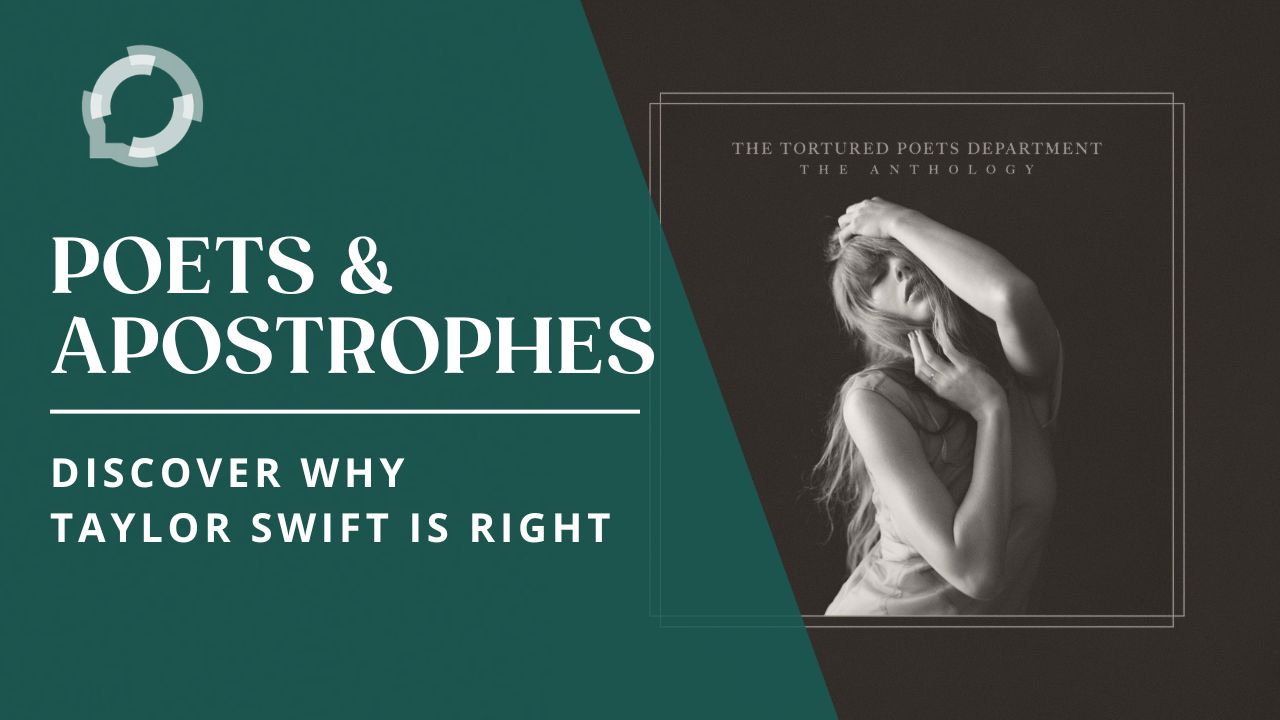For the last week of National Poetry Month, Taylor Swift has thoughtfully dropped her new double album The Tortured Poets Department. With its seemingly missing apostrophe, Swift’s album title has sparked a national, if niche, conversation about how punctuation shapes meaning. I’ve written a bit about using punctuation when reading poetry aloud to help express the rhythm of the lines, as well as the overlap among language development, poetry, and childhood development. Grammar and punctuation are topics I have many opinions about and I’m always interested in sharing them.
Confusion about Apostrophes
Swift’s album joins The Dead Poets Society as titles that seem to be missing an apostrophe, but aren’t. The movie Two Weeks Notice caused a stir when Lynne Truss, author of the popular grammar book Eats, Shoots & Leaves: The Zero Tolerance Approach to Punctuation called for an apostrophe, yet others disagreed.
Did you know that nouns can sometimes function as adjectives and be used to describe other nouns? They can, and that’s what’s happening with Swift’s album title. There’s a Department whose jurisdiction is Tortured Poets. The Poets don’t own the Department, so there’s no apostrophe to indicate possession.
Nouns used in this way are called “attributive nouns.” Notice familiar phrases like “business meeting” and “pet store;” in each, the first term is an attributive noun. Swift’s album title follows the same structure, even though “Poets” is plural.
Misuse of the apostrophe is so common that there are memes reminding well-intended but misinformed folks how to avoid the annual affront that is adding an apostrophe to a family’s name to make it plural: Merry Christmas from the Smith’s! Santa is bringing them coal next year!
The Rules
In 2022, misplaced apostrophes came in first in an CNBC article discussing the punctuation errors that irritate people the most. I can understand where apostrophe confusion and misuse arise. Apostrophes have two use cases. One of them is always simple and straightforward, but the other has complications according to context. That’s when many folks give up, aim an apostrophe at the end of a word willy nilly like they’re playing pin the tail on the donkey, and hope for the best.
Rule 1: The apostrophe indicates elision, inserted in the space where letters are missing. Most often, they indicate contractions, the merging of two verb forms or a pronoun and a verb: “can not” becomes “can’t,” “she would have” becomes “she’d have.”
Poets will often use an apostrophe to contract a word so it fits the work’s meter and rhythm. Emily Dickinson shortens “never” from two syllables to one in her poem “Success is Counted Sweetest”: “Success is counted sweetest / By those who ne’er succeed.”
Rule 2: The apostrophe indicates possession. While the concept is clear enough, the execution is where usage can get tricky. An apostrophe + “s” attaches to the end of a singular noun owning something: my grandmother’s house. For plural nouns owning something, the apostrophe follows the “s” at the end of the plural: my grandmothers’ house – two or more grandmothers have a house together.
Grammarly had a great cartoon on this point in 2014. The scene is an elementary school classroom, and a boy has made a family portrait. At the top, he’s written “Happy Mothers’ Day” and his teacher is pointing to show that the apostrophe should go between the “r” and “s.” The boy replies, “I have two mommies. I know where the apostrophe goes.”
Usage goes further awry when the singular noun ends in an “s.” Most often, singular nouns ending in “s” also get an apostrophe + “s”, UNLESS you’re using the Associated Press Stylebook and the thing owned also starts with an “s,” in which case, the possessive is just an apostrophe. The American Copy Editors Society (no apostrophe) gives these examples – “the boss’ specialty, the witness’ story” – and then dryly notes, “Not all style guides agree with that.”
Merriam-Webster Dictionary notes additional variations. Showing possession for proper names that end in an “s” or “z” sound takes either apostrophe + “s” OR just the apostrophe: for a car that belongs to Jones, you could use Jones’s car or Jones’ car. Classical and Biblical names with two syllables take just the apostrophe to be possessive, but single-syllable names take apostrophe + “s.”
When style guides and authoritative sources about language disagree about usage rules, no wonder the average person gets it wrong from time to time.
Bonus Meaning of “Apostrophe”
In addition to being a part of speech, an apostrophe is a literary device in which the author addresses a person who’s not immediately present or a personified inanimate object. Walt Whitman’s elegy for Abraham Lincoln addresses the slain President as “O Captain! My Captain!” Hamlet reminisces about court jester Yorick while holding the long-dead man’s skull in his hand and talking to it (Hamlet V.1.190).
Swift’s Choice
To be clear, though, I loathe that any part of the discussion about Swift’s album title questions whether she understood the choice she made with this name. Typos and proofreading mistakes happen, of course, sometimes in embarrassingly high profile situations. Mitt Romney’s Presidential campaign misspelled “America,” the Vatican released commemorative coins that misspelled “Jesus,” and the U.S. military routinely mis-directs sensitive email to Mali (email extension “ml”) rather than the intended American recipient (email extension “mil”.) That’s not what I mean.
Rather, it’s the subtly patronizing tone such as Victor Mather’s in his February 7, 2024 piece for The New York Times that irks me. After pointing out that using the apostrophe could create a department belonging to one poet (Poet’s) or to many (Poets’), Mather continues:
So which way should the title be? Before you decide that a feud on the scale of Kanye West versus Taylor Swift is breaking out, be aware that the consensus of professional grammarians is: It’s really up to Swift. …
And grammarians say not only that Swift has the choice of which to use, she probably also has chosen the right one for her intended meaning.”
Well, yes. Indeed.
Swift is an accomplished songwriter; TTPD is the 11th album in a highly successful, much-awarded career. For someone who pays as much attention to poetics and wordplay as Swift clearly does, assuming that she doesn’t know what she’s doing because she writes pop songs is insulting, with more than a whiff of misogyny as well.
How About You?
Is the apostrophe one of your grammar gremlins that routinely trip you up? Do you have to remind yourself of the rules before printing your winter holiday cards? Or are you the person who’s tempted to take a marker to insert a missing apostrophe or cross out a wayward one?
Are you a Swiftie ready to defend the singer-songwriter’s grammatical choices? Or have you been unaware of this controversy that’s been raging since the Grammy Awards?
More importantly, how’s the actual music? Many are complaining about Swift’s swearing on TTPD, chiding that she needs to consider her audience of young girls who look up to her as a role model, while legions of others point out that Swift writes from her own perspective for her whole audience, not just its youngest members.
Tell us about it in the comments.
Check Out Our YouTube Channel
The Rourke Training – Ongoing Mastery YouTube channel has a bit of something for everyone. Go there to get Kirsten’s take on examples of public speaking, as well as reflections on her entrepreneurial journey. The channel is also the home of the podcast Kirsten and Kellie produced for 5 years, Ongoing Mastery: Presenting & Speaking, which covers everything connected to continually improving your craft of being a public speaker, from interviews and mini-coaching sessions with guests to conversations between Kirsten and Kellie.
Come join us.
Cheers,
Kellie


